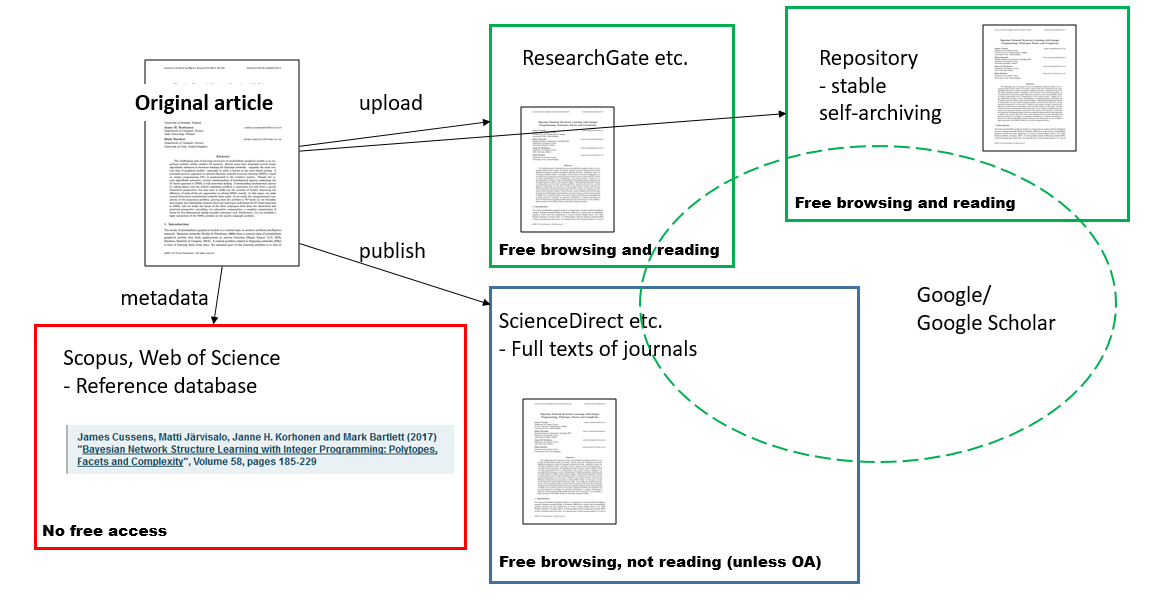Open access – for everyone
Being a member of university community gives you a great chance to find and read the most important scientific papers ever published and a huge amount of other important publications.
A large proportion of these publications is behind the so called paywall – the university has a subscription and pays for the access to read the publications.

Recent trend is to make access to scientific publications possible for everybody and thus promote the utilisation of science in the whole society.
An article or its’ metadata can be accessed different ways:

Open access is free for a reader
The Open Access –idea turns this system of payments upside down. To get an article published requires a fee, but once it’s published, all people can read it for free.
So, the costs are paid by the author of the article, not by the reader. This doesn’t mean that everything can be published if you just pay for it. The high-quality open access journals have the same peer-review process before publishing as all the other scientific journals.
Open access involves either whole journals, or single articles on a journal which is otherwise subject to a charge. The best open access journals are as highly valued as the traditional scientific journals. Some others are not quite established yet, but their importance is growing.

This system will help you to keep updated on the latest progress of science after your graduation if working outside the university or research institutions.
Repositories are open too
Another possibility to read scientific papers is through Repositories. The coverage of these services is still limited, but the overall tendency of opening the scientific information through various channels is increasing strongly.
Many public institutions have a publishing policy to offer their research results open to benefit of all the community. Serial publications, like working papers or research notes are published in the website of organisation for free. Repositories of institute archive all the publications permanently. They may also contain journal articles published elsewhere.
These resources can be accessed through Google or Google Scholar or by browsing specific organisations’ sites.
Some examples of repositories:
- UEF eRepository – contains UEF theses and dissertations as well as self-archived versions of articles and metadata of research data by UEF researchers: access to full-texts
- Jukuri – the repository of Natural Resources Institute of Finland
- Repository of Finnish Environment Institute
Some databases are free to use, others are not
As well as individual journals and articles are behind the paywall, also the most valuable information sources, like reference databases, are not free. There are some subject-specific, pleasing exceptions available though.
Using library databases, like UEF Primo, is free, but the access to electronic publications full texts is still depending on your status. The situation is the same with Google Scholar and some publication databases that can be searched for free – unless the publication is open for all.
Open resources, examples:
- Scitation by AIP Publishing (physics)
- ChemSpider by RSC (chemistry) (search is done with chemical names or structures)
- Agris by FAO (agriculture and forestry)
Open archives, Xivs, are a publishing channel for preprints
- AgriRxiv (full text preprints of agriculture; very limited)
- arXiv (full text preprints of mathematics and physics)
- BioRxiv (full text preprints of biology)
- ChemRxiv (full text preprints of chemistry)
- Engineering archive engrXiv
Piracy is illegal
In the Internet there are a lot of pirate web pages offering a free access to publications initially subject to a charge. As handy as they might seem, they violate copyright laws and their use is illegal.
Open science is a wide complex
Open science is more than just open publishing. Read more from UEF Open science -pages.
To Do:
- Use legal sources
- Use all kind of sources, free and paid, while at the university
- Remember the open publication sources after graduating
Next page: Terms of use